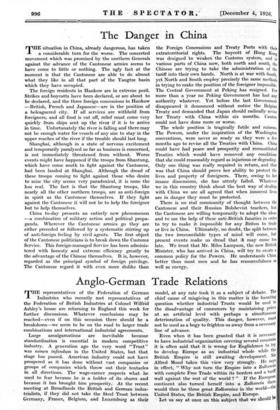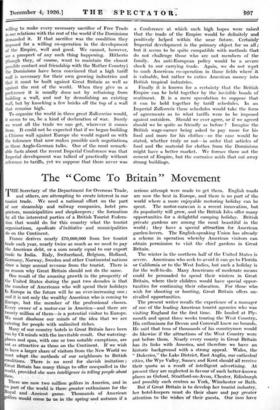Anglo-German Trade Relations
THE representatives of the Federation of German Industries who recently met representatives of the Federation of British Industries at Colonel Wilfrid Ashley's house are returning to England this week for further discussions. Whatever conclusions may be reached—even if on this occasion there should be a breakdown—we seem to be on the road to larger trade combinations and international industrial agreements.
Large amalgamations are inevitable because standardization is essential in modern competitive industry. A generation ago the very. word "Trust" was nomen infondum in the United States, but that stage has passed. American industry could not have prospered as it has done without vast companies or groups of companies which throw out their - tentacles in all ,directions.. The wage-earner respects what he used to tear because he - is a holder of its shares and because it has brought him prosperity.: At the recent meeting at Broadlands the British and German indus- trialists, if they did .not take the Steel Trust between Germany, France, Belgium, and Luxemburg as their model, at any rate took it as a subject of debate. The chief cause of misgiving in this matter is the haunting question whether industrial Trusts would be used to the disadvantage of consumers by maintaining prices at an artificial level with perhaps a simultaneous deterioration of quality. This danger, however, mast not be used as a bogy to frighten us away from a necessary line of advance.
Even when it has been granted that it is necessary to have industrial -organization covering several countries it -is often said that it is wrong for Englishmen to try to develop Europe as an industrial whole while the British Empire is still awaiting development. Sir Alfred Mond takes this view very strongly. He says in effect, " Why not- turn the Empire into a- Zollvereis with complete Free Trade within its borders and a tariff wall against the rest of the world ? " If the European continent also turned herself into a Zollverein there would then be three great Zollvereins in the world—the United States, the British Empire, and Europe. Let us say at once on this subject that we should be willing to make every necessary sacrifice of Free Trade in our relations with the rest of the world if the Dominions demanded it. If that sacrifice was the condition they imposed for a willing co-operation in the development of the Empire, well and good. We cannot, however, see a prospect of any such thing happening. Hitherto (though they, of course, want to maintain the closest possible contact and friendship with the Mother Country) the Dominions have been convinced that a high tariff wall is necessary for their own growing industries and (hat it must be built against Great Britain as well as against the rest of the world. When they give us a preference it is usually done not by refraining from building a wall, and not by demolishing an existing wall, but by knocking a few bricks off the top of a wall that remains high.
To organize the world in three great Zollvereins would, it seems to us, be a kind of declaration of war. Surely we want all the trade we can get, wherever it comes from. It could not be expected that if we began building a Chinese wall against Europe she would regard us with the tolerance that now makes possible such negotiations as these Anglo-German talks. One of the most remark- able facts about the recent Imperial Conference was that Imperial development was talked of practically without reference to tariffs, yet we suppose that there never was a Conference at . which such high hopes were raised that the trade of the Empire would be definitely and positively helped within the near future. Certainly Imperial development .is the primary object. for • us all ; but it seems to be quite compatible with methods that do not challenge those who are not members of the family. An anti-European policy would be a severe shock to our carrying trade. Again, we do not wet to snub American co-operation in those fields where it is valuable, but rather to entice American money into British tropical industries.
Finally it is known for a certainty that the British Empire can be held together by the invisible . bonds of sentiment. It is a mere speculation to suppose that it can be held together by tariff schedules. In an Imperial Zollverein these schedules would take the form of agreements as to what tariffs were to be imposed against outsiders. Should we ever .agree, or if we agreed should we be quite as friendly as before ? Imagine the British wage-earner being asked to pay more for his food and more for his clothes—so the case would be stated, whether truly or not—in order that articles of food and the material for clothes from the Dominions might have a better market. We foresee there not the cement of Empire, but the corrosive acids that eat away strong buildings.































































 Previous page
Previous page